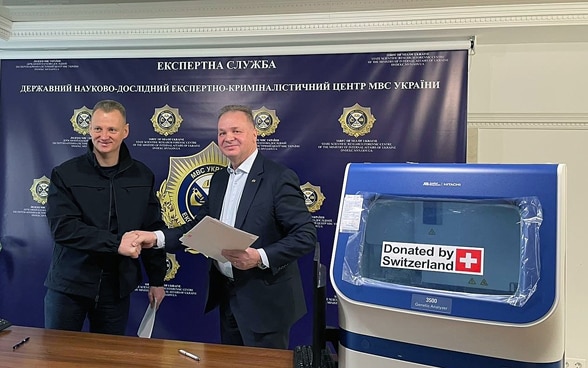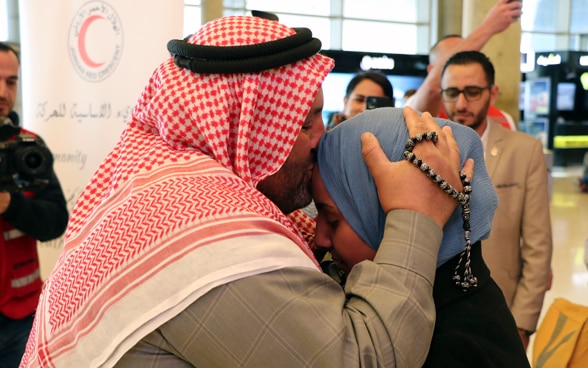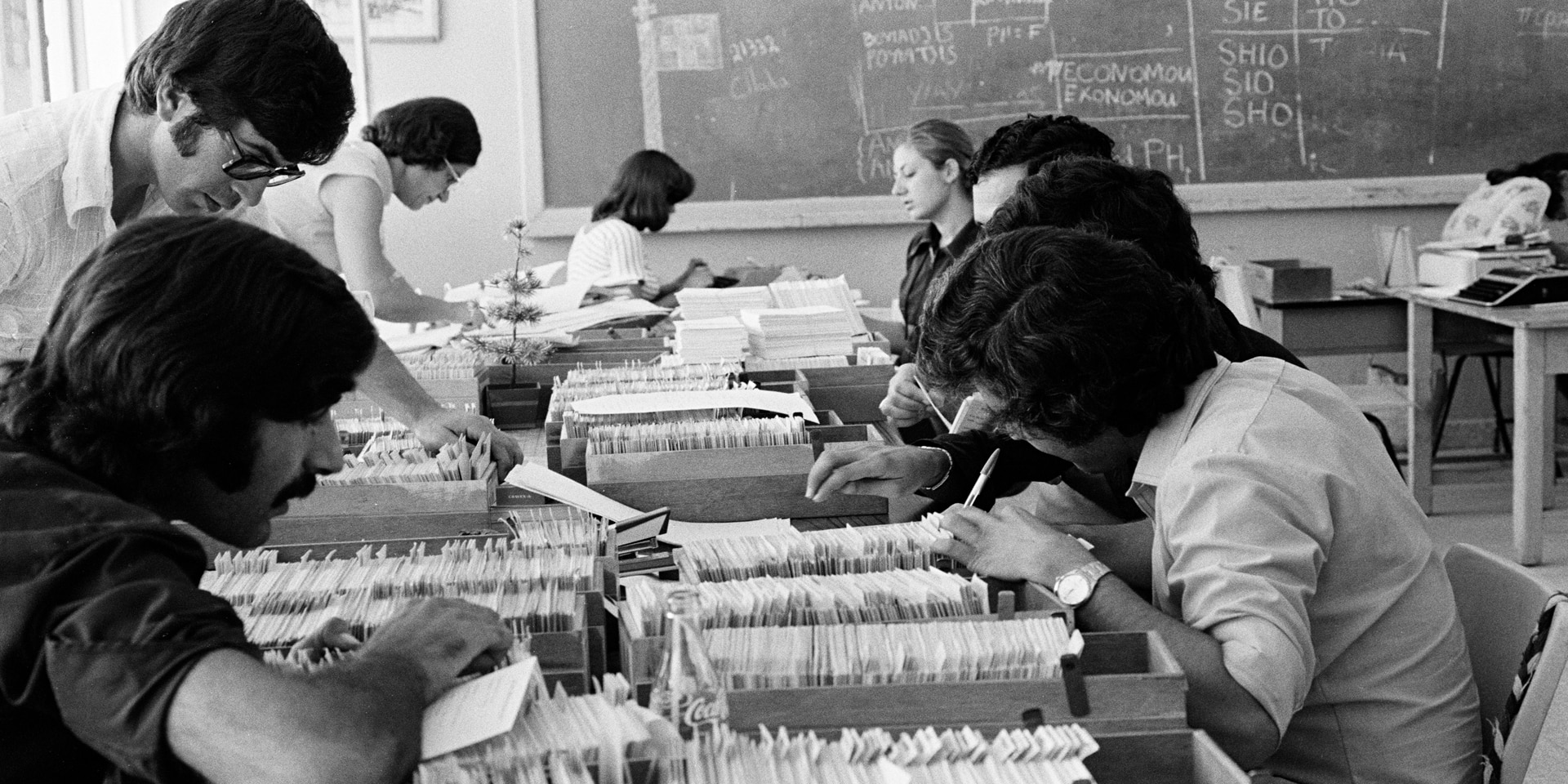Finding and identifying missing persons is essential to rebuilding countries
As part of its peace policy, Switzerland is committed to identifying and finding missing persons. The missing persons programmes run by the FDFA's Peace and Human Rights Division (PHRD) prioritise Ukraine, the Caucasus, Kosovo and the Middle East. Switzerland also supports the ICRC's Central Tracing Agency – a cornerstone of the Swiss humanitarian tradition – and co-founded the Global Alliance for the Missing.

Switzerland supports the ICRC's Central Tracing Agency, based in Geneva. Here, an ICRC staff member supports a family in Luhansk in the search for a missing relative. © ICRC/Pieter-Jan De Pue
Thousands of people go missing each year due to conflicts, migration and disasters. Russia's military attack on Ukraine, launched in February 2022, has had a devastating impact on families and communities, with over 26,000 people reported missing. As well as placing an intolerable burden on families, the issue of missing persons also hampers efforts to promote peace and social cohesion. "If left untreated, these wounds can divide communities. Establishing what happened to missing persons is essential to reconstruction efforts and dealing with the past. The process is key to achieving lasting peace", says Rea Gehring, deputy head of the PHRD.
Searching for and identifying missing persons is a priority for programmes run as part of Switzerland's peace policy and its efforts to assist victims of armed conflicts. This is a key concern in Ukraine, where PHRD staff launched a field operation on 24 October. As well as getting an idea of the situation on the ground, the object of the initiative is to talk to appropriate Ukrainian authorities and civil society organisations and review and adjust Switzerland's support where necessary.
DNA identification and IT equipment for Ukraine
Switzerland initiated its efforts to locate missing persons in Ukraine in 2016, in response to the armed conflict that has plagued eastern Ukraine since 2014. Switzerland has been supporting the work of the ICRC and has stepped up its commitment due to the sharp increase in missing persons since February 2022. This decision was taken following Federal Councillor Ignazio Cassis' visit to Kyiv in October 2022.
Through the PHRD, Switzerland has subsequently donated items such as computers and furniture to the Ukrainian authorities in charge of finding and identifying missing persons. "This has enabled 18 offices to be opened across 18 regions of Ukraine. With a local base, we can assist families more effectively," explains Rea Gehring. Switzerland has also donated equipment to Ukraine to facilitate DNA analysis and expedite the identification of bodies.

In addition, Switzerland is co-funding the work of the new CTA office, which was set up in Geneva last March to focus on the conflict between Ukraine and Russia. The CTA is working with both countries to collate, centralise and disseminate information on the fate of captured military personnel and civilians. "Searching for missing persons is an opportunity to move beyond conflict lines and prejudice. It also keeps the channels of communication open for future dialogue," says Rea Gehring. "It definitely depends on each party cooperating, but Switzerland and the organisations it supports are providing the opportunity to both sides.
Yielding results decades on
Aside from its work in Ukraine, finding and identifying missing persons are also central to Switzerland's international cooperation programmes in Syria, Lebanon, Georgia, Kosovo, Colombia and Mexico, for example. The PHRD tailors its approach to the particular context and issue, taking account of its long-term objective which is to create the conditions needed to find political solutions to conflicts.
In July 2023, for example, the remains of 13 people in Georgia, who were reported missing in the 1992/3 Abkhazia conflict, could be returned to their families thanks to Switzerland's support for the ICRC and a local NGO. "Even decades after the event, missing persons work is an essential part of dealing with the past" says Rea Gehring.
Switzerland is involved at various levels in Syria, where 130,000 people have disappeared since the conflict began in 2011. It provides support to family and victims' organisations at local level, discusses missing person issues with the relevant authorities and engages in dialogue at multilateral level. In June 2023, Switzerland co-sponsored a resolution, adopted by the UN General Assembly, establishing an Independent Institution on Missing Persons. The necessary groundwork is now underway and Switzerland is working to ensure that the institution is actually established. It is currently assisting the Office of the High Commissioner for Human Rights which is responsible for drafting the institution's terms of reference.

Building expertise in forensics
Switzerland is also active in the Balkans. It assisted the Kosovan police force in digitising archives on people from EU and UN missions who have disappeared. Switzerland is also working to facilitate cooperation between Kosovo and Serbia through the use of new technology to help trace missing persons.
In 2022 and 2023, Switzerland set up a programme in Mexico to train forensics specialists in the latest techniques available for finding and identifying missing persons. The training was provided by the Centre Universitaire Romand de Médecine Légale (forensic medicine centre) and the School of Criminal Justice at the University of Lausanne.
Switzerland's support for the ICRC
In addition to the specific work undertaken around the world, Switzerland also supports the ICRC's Central Tracing Agency (CTA), which includes the office focusing on Ukraine and Russia (see above). The Geneva-based CTA, which was established over 150 years ago, is a cornerstone of the Swiss humanitarian tradition and operates throughout the world.
To mark the CTA's 150th anniversary, Switzerland established the Global Alliance for the Missing in cooperation with the ICRC. The objective of the Global Alliance, which currently has twelve member states, is to step up collective diplomatic engagement to prevent people from going missing, clarify the fate of missing persons, clarify the fate and whereabouts of those who do, respond to the needs of families and respect the dignity of the dead. It recorded its first success in May 2023 when it delivered its first joint statement during the UN Security Council’s open debate on the protection of civilians, chaired by Switzerland. It stressed the need to ensure implementation on the ground of UN Security Council Resolution 2474 – the first resolution specifically addressing missing persons in armed conflict.

